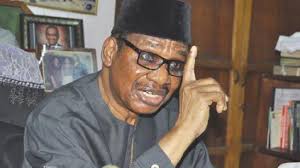Nganjiwa case not applicable to Onnoghen, says Sagay
Presidential Advisory Committee Against Corruption (PACAC) Chairman Prof Itse Sagay (SAN) on Sunday disagreed with those who argue the asset non-declaration charge against Chief Justice Walter Onnoghen should have been first dealt with by the National Judicial Council (NJC).
The Court of Appeal had held in the Justice Hyeladzira Nganjiwa case that it would amount to the usurpation of NJC’s powers if any judicial officer commits a professional misconduct within the scope of his duty and is investigated, arrested and subsequently prosecuted without a formal complaint/ report to the NJC.
Several senior lawyers have argued that Court of Appeal judgment should have been complied with before a charge was filed against the CJN at the Code of Conduct Tribunal (CCT).
But Sagay, in an interview with our correspondent, slammed the Court of Appeal for the judgment, describing it as unconstitutional and a bid by the justices to get immunity through the back door.
His words: “I want to make a few points. The first is that the Nganjiwa case, as far as I’m concerned, is unconstitutional. That judgment was unconstitutional. It’s an illegal judgment.
“It is an illicit attempt by some Justices of the Court of Appeal to give themselves immunity contrary to the provisions of the Constitution.
“The Constitution has named those entitled to immunity – the President, Vice President, Governors and Deputy Governors.
“What these Justices tried to do is to take over the job of the National Assembly, amend the Constitution and then hide themselves inside as those who are immune from prosecution. To me, it’s illegal and unconstitutional.
“Number two, I’ve read the Nganjiwa judgment. It’s a judgment limited to a judge who was acting as a judicial officer, who was hearing a case and in the process was found guilty of misconduct in the hearing of that case.
“This matter that has just occurred has nothing to do with a case in court. It has something common to all public officers before you take an office. So, there’s a major distinction. The Nganjiwa case does not cover this situation.
“Thirdly, we’re talking of the Chief Justice of Nigeria, head of a branch of government; in fact I’ll say head of the most important branch of the government, because they’re the arbiters of anything that goes wrong in the other two arms.
“It is said that Julius Ceasar’s wife must be above board. If I’m the Chief Justice, even a judge, and you bring such a charge against me, I will not contest jurisdiction. If I contest jurisdiction and win, you’re still going to say: ‘But you did it’.
“Rather, I’ll waive the issue of jurisdiction, because my status is so high that I must have a clean image before the world, so that the institution I represent may not be tainted.
“Those hiding behind jurisdiction are trying to cover up iniquities of some sort. I’m speaking generally now.
“Those who are bringing that issue up are creating a problem for this country, because the sore will still be there. It’s as if they’re saying no doctor should treat it.
“Those cases that went on for 12 years were because of the issue of jurisdiction – all the looters’ cases. It’s jurisdiction that was argued from High Court to Supreme Court and back. The issue of bleeding this country to death through corruption was never touched.
“I think at the level of the officer we’re talking about now, we shouldn’t be talking of jurisdiction. We should be talking of the substance. Did he or did he not do it? That’s all.” (The Nation)


